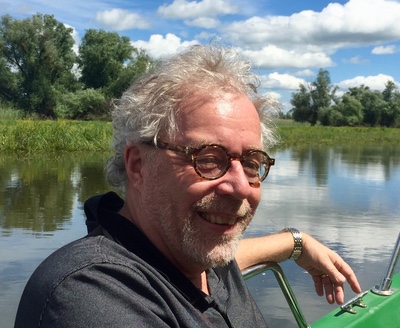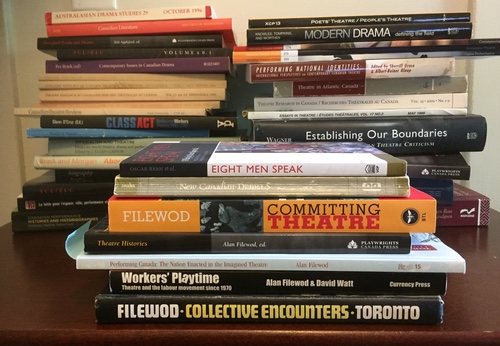4 Questions: Alan Filewod

Alan Filewod (Theatre Studies ’76) joins us to talk about his journey in Theatre, from his time starting out at York to his time as a theatre professor at the University of Guelph.
This article is the third in our series 50 Years of Disruption, in celebration of the Department of Theatre’s 50th Anniversary. In it, we’ll ask each participant four questions about themselves and their time at York.
1. Who are you?
As I step into retirement after four decades in an academic career—hundreds of lectures, thousands of students, millions of words—I realize my career was the result of a thing that didn’t happen—when I missed the audition for York’s acting program. I was a middling high school student in Ottawa with vague dreams of stage glory. I don’t know why I chose York. My high school guidance counselor warned me against it (too radical, too many freaks). But it was the only university I applied to and when the audition notice came in the mail, I was struck by panic. How to get to Toronto? Where is York anyway? Panic won; I missed the audition and went back to my dishwashing job. And then, to my surprise, York sent me a letter of admission into what was then called Drama Studies. My parents were bemused. The first kid in the family ever to go to university, and I was going to study theatre? What is that anyway? My father advised to me to take geology because then I could get summer jobs on field expeditions.
So off I went to York to see what would happen. York was small and remote in those days. From my room in Vanier residence I could see farmers in their tractors north of Steeles. I wasn’t thrilled with the first-year course offering (a lecture course called “About Acting”) but I saw that there was a second-year course in “Theatre and Society” taught by some guy named Rubin. I tracked him down and he signed me into the course. When I aced the midterm with a 100%, something important shifted and clicked into place. I had found the thing that I loved and that I could do better than anyone else. It turned out that Drama Studies wasn’t just a degree-granting holding tank for students who missed an audition or were washed out of the acting program. It was also the eclectic meeting place for a fascinating group of misfit aspiring critics, playwrights, dramaturgs, scholars and theatre geeks.
York Theatre was a wildly creative and innovative place in the early 70s. It seemed unbound by tradition and open to anything. The faculty was an explosion of talent but two in particular opened doors for me. Mavor Moore was teaching the first-ever course on Canadian theatre history (and thereby sent me on my professional path); Don Rubin’s criticism workshop taught me how to write and edit. They were trailblazers and generous, demanding mentors, and I owe my career to them. (And when I took a political science course, my TA was Jack Layton!)
2. What was your favourite moment during your time in the Theatre Department, and why?
In my third year I was one of the editorial assistants on Canadian Theatre Review. I still remember the thrill of seeing my name on the masthead. The conversations, debates and arguments we all shared shaped my intellectual future. I learned to open up to passion. And I learned the imperative of dissent.
3. What comment, quotation, statement, or action that a professor—or classmate—offered had the greatest impact on you?
In my third year I won a summer travelling scholarship; my plan was to go to Newfoundland and research traditional folk performance (my then partner was in a dance troupe that was going to be touring Newfoundland, so it seemed like a good idea). Don Rubin suggested I look up a guy named Chris Brookes who was starting a political theatre troupe in St. John’s called the Mummers. I ended up joining the troupe and spent the next year doing radical community-based devised theatre. In that year I developed the aesthetic and political principles that framed my subsequent work as a teacher and scholar. And when I went to grad school two years later and heard a professor pronounce that there was no political theatre in Canada, I knew I had found my research field.
4. Is there a way you incorporate a particular aspect of your theatre training in your current work?
In my work as a professor I have directed many shows with students. York taught me to see the rehearsal room as a space of collaboration and creativity. In the early 70s universities could afford to bring in shows and we saw brilliant theatre. I was astonished byRichard Schechner and the Performance Group (including Spalding Gray), Joseph Chaiken and the Open Theatre, and the Alvin Ailey Dance Theatre. The power of collective and devised performance shook me, and still does. And as a teacher, I learned my pedagogy at York from brilliant teachers who modeled basic truths: love what you teach, teach what you love, and always question authority.

